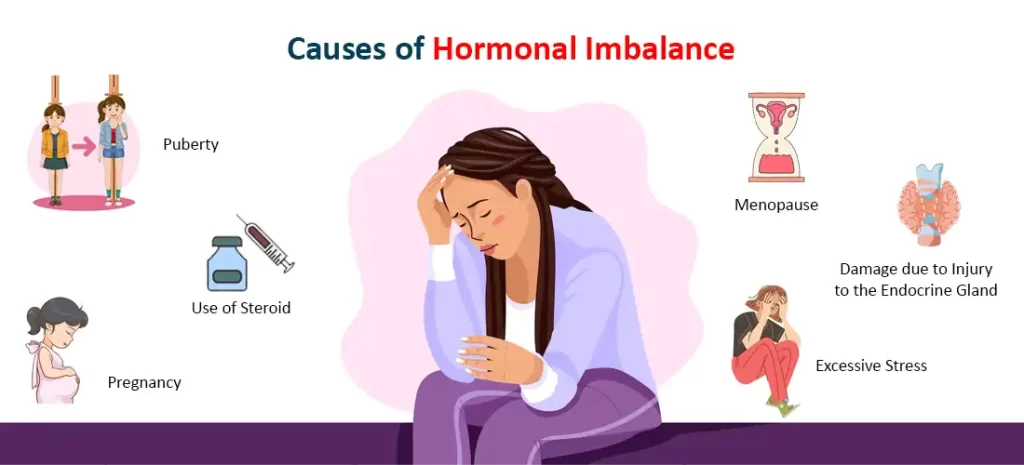
Signs of hormonal imbalance & treatment in Kenya
When you hear the word hormones, many people associate it with a female issue; nevertheless, the term hormones refers to both genders, male and female. In this scenario, it’s more important to grasp what hormones are and how they work in the body. What it is to have high or low levels, and how they affect the system.
What are hormones, their causes, signs and symptoms, the effects of hormonal imbalance, and how to balance hormones naturally?
Hormones are chemical messengers that go via the bloodstream to tissues and organs, signaling to the body how and when to respond to various bodily processes.
These bodily activities include metabolism, homeostasis, growth and development, sexual function (reproductive health), mood, sleep patterns, and so on.
These hormones include estrogen, testosterone, adrenaline, insulin, cortisol, progesterone, and thyroid hormone.
What role do hormones perform in the body?
These hormones influence our mental, physical, and emotional well-being, as well as our reproductive health.
We have listed the glands below, along with the hormones they secrete and their roles in the body.
Pituitary gland – secretes adrenocorticotropic hormone, luteinizing hormone, follicle-stimulating hormone, and thyroid-stimulating hormone.
Thyroid hormone – helps the body’s processes, such as metabolism, mood, respiration, and heart rate, run properly. If this hormone level is insufficient or is above normal, it affects weight, cardiovascular health, and cholesterol levels.
Adrenocorticotrophic hormone – This hormone regulates the cortisol hormone; when the hormone cortisol is low, it impacts weight, resulting in weight loss and digestive disorders such as vomiting, nausea, loss of appetite, and low blood pressure. If cortisol levels are excessive, it can lead to illnesses such as Addison’s disease and Cushing syndrome, both of which influence weight and cause weight gain.
Luteinizing hormone – This hormone regulates the menstrual cycle and is essential for female reproductive health. In men, it increases testosterone production, which is necessary for sperm formation.
Follicle-stimulating hormone – plays an important role in sexual development and function. It increases egg production in the ovaries and regulates the menstrual cycle.
Dopamine hormone – This neurotransmitter promotes movement, memory, pleasure, reward, and motivation. High or low levels affect mood, as well as the brain and nervous systems.
Insulin hormone – Produced by the pancreas, insulin aids in glucose metabolism, reduces blood glucose levels, and increases glucose storage in fat, muscles, liver, and other tissues. If there is an insulin imbalance, it affects weight and produces weariness owing to impaired body metabolism. It is the leading cause of imbalanced blood sugar levels, so check for diabetes.
Melatonin hormone – The pineal gland produces melatonin, which controls sleep patterns known as circadian rhythms.
What’s the hormonal imbalance?
These hormones must be at a particular level for the body to function normally; if either is low or higher than usual, it is considered a hormonal imbalance.
What causes hormonal imbalance?
Hormones rise and fall for a variety of causes, including specific periods of life, the natural aging process, and external factors. Let’s take a look at what causes these hormone fluctuations.
Factors that influence, and cause hormonal imbalance.
Stress
Stress causes the adrenal gland to release more cortisol hormone. This frequently results in impacts on the cardiovascular, pulmonary, gastrointestinal, neurological, and reproductive systems. This has a detrimental impact on sleep, making you feel restless or tired, changing your mood, and changing your appetite, all of which affect your weight.
When we talk about stress, we don’t only mean emotional stress; it can also be caused by physical or social stress, all of which contribute to hormonal imbalances.
According to studies, stress is the main contributor of hormonal abnormalities.
Age
Some hormones drop with age as a natural part of the aging process. Some people suffer hormonal changes when they reach puberty, become pregnant, or enter menopause.
Autoimmune disease
This occurs when the immune system targets a gland or organ that generates hormones, resulting in hormonal abnormalities.
Poor dietary intake and lack of physical activities
This predisposes a person to becoming obese or overweight. This has a significant impact on hormone balance.
Gastrointestinal issues
Hormones regulate gut processes; for example, cells in the gut’s mucosa lining manufacture and secrete hormones such as cholecystokinin, which aids digestion and lowers appetite. It achieves this by slowing the emptying of the stomach, boosting bile synthesis in the liver, and releasing bile from the gall bladder. Certain high fiber foods may help in activating cholecystokinin hormones responsible for appetite regulation when struggling with weight loss.
Peptide YY hormone, which is secreted by the small intestines, helps to suppress appetite by slowing gastric emptying.
Glucagon-like peptides – Released by the small intestines to respond to food consumed, causing appetite decrease and insulin release.
Gastric inhibitory polypeptides – this hormone inhibits fat breakdown and promotes fat accumulation.
5HTP hormone – It’s found in the cells lining the gastrointestinal tract. It helps play a role in mood, emotions, appetite, and digestion and regulates sleep-wake cycles. You may purchase 5htp as a supplement online if you are finding it hard to sleep or appetite loss or low mood and feeling irritable.
So if you have a gut disorder it often affects your appetite levels, mood even metabolism, etc.
Adrenal disorder
The adrenal gland generates hormones that control metabolism, immunological function, blood pressure, and stress response. It also creates the sex hormones androgen and estrogen. If this gland is affected, the reproductive health suffers as well.
Certain medication
These medications can be birth control pills, antidepressants, etc.
Tumors and growths
Thyroid nodules may cause either hypothyroidism or hyperthyroidism.
What are the tell-and-tell signs of hormonal imbalance?
The levels of hormones secreted by glands or organs vary depending on the intensity with which they are released and the illness or underlying disorder. Here are the signs of hormonal imbalance & treatment in Kenya will depend on what kind of approach one is using in management of the imbalance.
To begin, we will discuss the common indications and symptoms that men and women experience. They include: –
- Weight gain or loss
- Muscle weakness, aches, tenderness, and stiffness of the joints.
- Frequent urination
- Increase hunger, thirst
- Low libido
- The hump of fat below the shoulders (Cushing syndrome)
- Depression, anxiety, stress
- Digestive disorders e.g. Constipation, frequent bowel movement
- Blurry vision
- Dry skin
- Hair loss
- Infertility
- Acne
Signs of hormonal imbalance particular in women
Infertility issues – Inability to conceive in case of PCOS, fibroids, endometriosis, etc.
Thin hair
Acne
Skin tags
Hot flashes
Irregular periods
Headaches especially during periods or during the menopausal phase
Excess abnormal hair e.g. hirsutism
Signs of hormonal imbalance particular in men
They include; –
Loss of muscle mass
Osteoporosis
Low libido, erectile dysfunction
Lack of focus
Infertility
Decreased beard growth and body hair growth
By now we are aware of the signs of hormonal imbalance & treatment in Kenya may be through a nutritionist and doctor working close to close in order to give the right approach both naturally and convectionaly.
If you feel or believe that you have hormonal imbalances, consult your doctor about getting some tests done, such as a blood test, ultrasound, blood sugar test, thyroid scan, sperm count test, fertility test, and so on.
If one does not seek medical assistance in a timely manner, various consequences may arise later. As a result, it’s important to pay attention to your body and how you feel, and to seek medical assistance as soon as possible. This is because some problems are more likely to emerge if hormone levels aren’t within acceptable ranges.
CONDITIONS ASSOCIATED WITH HORMONAL IMBALANCE
Infertility – Pcos caused by changes in the menstrual cycle due to estrogen and progesterone hormone imbalances. reduced libido can result from reduced production of sex hormones, such as testosterone, which can cause muscle loss, mood changes, and erectile dysfunction.
Insulin resistance – Some studies have showed that a percentage of women with PCOS are insulin resistant. This increases the risk of diabetes.
Hormonal acne – Hormonal variations, particularly when testosterone levels are high, cause excessive sebum secretion, which results in acne breakouts.
Thyroid diseases – Low or high thyroid hormone production can cause weight gain or loss, heart palpitations, weariness or low energy, and neurological system difficulties.
Diabetes is caused by an insulin hormone imbalance, which impairs the body’s capacity to manage glucose levels. This causes weight loss or gain, neuropathy, eyesight issues, weariness, skin ailments, and so on.
Anxiety disorders or depression – As previously said, serotonin hormone secreted by the small intestines has a role in mood balance, appetite, brain function, and reproductive health; if this hormone production is disrupted, anxiety troubles, depression, changes in appetite and mood, and so on may occur.
Obesity and overweight: Hormones have a vital function in weight management. An elevated cortisol in the body might interfere with appetite, causing people to acquire weight. Low cortisol levels can also decrease metabolism, causing one to become chubby or overweight. Hormonal imbalance in women can also contribute to weight changes, particularly in those with fertility concerns such as PCOS or during the menopausal phase.
TREATMENT OPTIONS USING A NUTRITIONAL APPROACH
Medication for hormonal imbalance differs depending on the gland affected and the hormone causing it.
Most essential, it is important to determine what condition has formed or what may pose a danger for illness development.
Nutritional supplements can help with hormone imbalances, but you should consult with a professional to get the correct prescription. Click here to schedule a consultation.
These supplements include testosterone, estrogen, progesterone, and thyroid supplements. These serve to treat infertility, acne, sexual dysfunction, and metabolic diseases. Etc.
To improve quality of life and manage metabolic disorders caused by hormonal imbalances, it’s important to adopt a healthy lifestyle and eat the right foods. Supplements can help regulate blood sugar levels for diabetes, prediabetes, and women with PCOS symptoms.
10 WAYS TO BALANCE YOUR HORMONES NATURALLY
CONCLUSION
Hormones are chemical messengers that go via the bloodstream to tissues and organs, signaling the body when to respond to certain bodily processes.
Hormonal imbalances can be caused by aging, stress, a bad diet, autoimmune disorders, or even gut troubles.
Hormone levels, whether low or high, can be harmful to one’s health. Hormonal imbalances can cause problems with reproductive health, digestion, the neurological system, and even metabolism.
Now that we have looked at the signs of hormonal imbalance & treatment in Kenya can be both conventional and natural, improving quality of life. This means adopting a healthy lifestyle and taking supplements as prescribed by a competent nutritionist expert.

